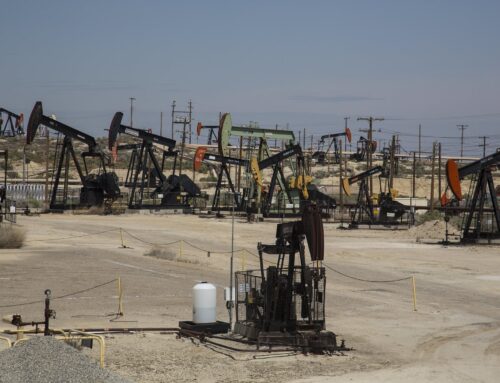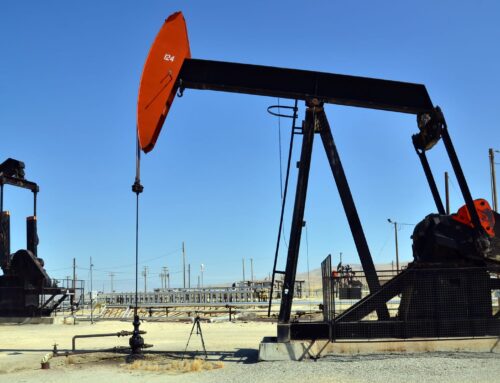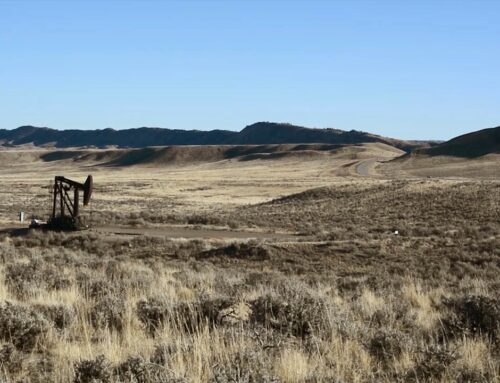(Missoula Current) Federal tax watchdogs and citizens who use public lands are speaking out against a Senate bill that would prioritize resource extraction over all other uses on federal lands.
Last week, Sen. Steve Daines, R-Mont., introduced a bill requiring oil and gas lease sales on all eligible federal parcels in eight Western states, including Wyoming, New Mexico, Colorado, Utah, Montana, North Dakota, Oklahoma, Nevada and “any other state in which there is land available for oil and natural gas leasing” under the Mineral Leasing Act.
Under the bill, leases could be issued even in areas identified for conservation purposes such as wetlands restoration and habitat protection unless excluded under a state management plan.
Senate Bill 460, titled the “Supporting Made in America Energy Act,” would also require offshore lease sales in the Gulf of Mexico and Alaska’s Cook Inlet. Finally, the bill also prevents presidents from impeding or canceling any sale through executive orders. Eleven Republican senators signed on as cosponsors.
“Now that we have a President who supports our energy industry instead of pushing a radical environmental agenda, it’s time to get to work on real change to unleash American energy and ensure that we remain dominant on the world stage. These bills will have a huge impact on creating Montana jobs, boosting our economy and protecting our national security, and I’ll work with my colleagues every step of the way to get them over the finish line,” Daines said in a statement.
But some nonprofit groups are pushing back against Daines’ bill and similar efforts, saying the U.S. is already producing the most oil of any nation on Earth, and oil and gas companies aren’t using all the extra leases they own.
The vast majority – 90% – of U.S. oil production occurs on non-federal land. On federal land, oil and gas companies have more than 24 million acres under lease but close to half are not producing, partly due to speculative bidding.
Even so, during the Biden administration, U.S. crude oil production hit a world record-high of almost 13 million barrels a day in 2023 and is projected to have produced even more in 2024. The U.S. passed Russian and Saudi Arabia in production in 2018 and continues to hold the top spot.
During a press call on Wednesday, David Jenkins, Conservatives for Responsible Stewardship president, said the amount of U.S. natural gas production is similarly high so there is no need to roll back recent oil and gas lease reforms. Those reforms helped American taxpayers by increasing the oil and gas royalty rate, which hadn’t been raised in more than a century, and creating a bond to ensure companies pug and clean up their wells after they’re done.
“Tough scrutiny should be directed toward Sen. Steve Daines, as he and Congresswoman Lauren Boebert sponsored a resolution last year to side with scammers and roll back bonding reform,” Jenkins said. “Now, Daines is diving headfirst into this imaginary market-defying ‘energy emergency’ narrative by introducing (Senate Bill 460), which would subvert all other natural resource values and give oil companies carte blanche to exploit our public lands and waters as they see fit. None of this is conservative. None of this is market driven. It’s nothing more than a naked effort to enrich a few at the expense of the many.”
Before the reforms, oil and gas companies did a lot of speculative bidding because it cost little to bid on a lease and often only one bid was received so leases were sold at low prices. Steve Ellis, Taxpayers for Common Sense president, said that in Montana, between fiscal year 2013 and 2022, 27% of the acres leased to oil and gas companies went for just $2 an acre and 36% went for less than $10 an acre. In 2017 and 2018, one company was able to get 228 noncompetitive leases in Montana covering 113,000 acres.
Finalized in 2023, the reforms raised the minimum allowable bids and eliminated noncompetitive leasing and the results are clear. Ellis’ organization did an analysis that showed, in 2024, the average lease bid was $2,149 per acre, more than 150 times the average bid from 2017 to 2020 before the reforms were passed. As a result, speculative bidding in areas with low potential for oil and gas declined: The lease sale in Nevada, which has low potential, garnered no bids, while sales in New Mexico and North Dakota brought in bids that were significantly higher than in previous years.
“This means public lands are being leased where there is real development potential ensuring taxpayers get a fair return while freeing up other areas for recreation and other uses,” Ellis said.
But if S.460 passes, the Interior Secretary would be required to offer leases even in the unproductive public lands of Nevada. When oil and gas companies have bought them before, it usually doesn’t lead to energy production but it does close those areas to other uses, said Russell Kuhlman, Nevada Wildlife Federation executive director.
“The biggest misconception is that oil and gas is under every acre of public land waiting to be drilled. That could not be further from the truth,” Kuhlman said. “For an administration that has run on a platform of reducing waste and improving efficiency, this push to ‘drill, baby, drill’ cannot be more counterintuitive. Because a lot of this here in Nevada is going to be a waste of time.”
Out of 22,000 leases in Nevada, only 70 have entered production. Last year, a lease of 5,000 acres in Railroad Valley, an area of low potential, received no bids, thanks to the bidding reforms.
Meanwhile, much of Nevada’s public lands are important for wildlife such as mule deer and sage grouse. But when sportsmen’s groups tried to close leases in Nevada’s Ruby Mountains where no oil has been extracted, the administration cancelled the public comment meeting last week.
“We’re concerned about removing the public comment opportunity to how we’re going to manage our public lands for multiple use. What we’re seeing here in the early stages of this administration is a steamrolling effect that oil and gas is going to rule above all and conservation is going to get a back seat or no seat at the table,” Kuhlman said.
Jenkins said the states have tended to implement reforms, such as increasing fees or minimum bids, before the federal government does, particularly if the reforms have an effect on state budgets. So the federal government should follow the states and Congressional delegations should look out for their constituents, not companies.
“If this administration or Sen. Daines tries to roll this back, it’s American taxpayers all over the country that are getting screwed,” Jenkins said.
Contact reporter Laura Lundquist at lundquist@missoulacurrent.com.
- Canva Pro










